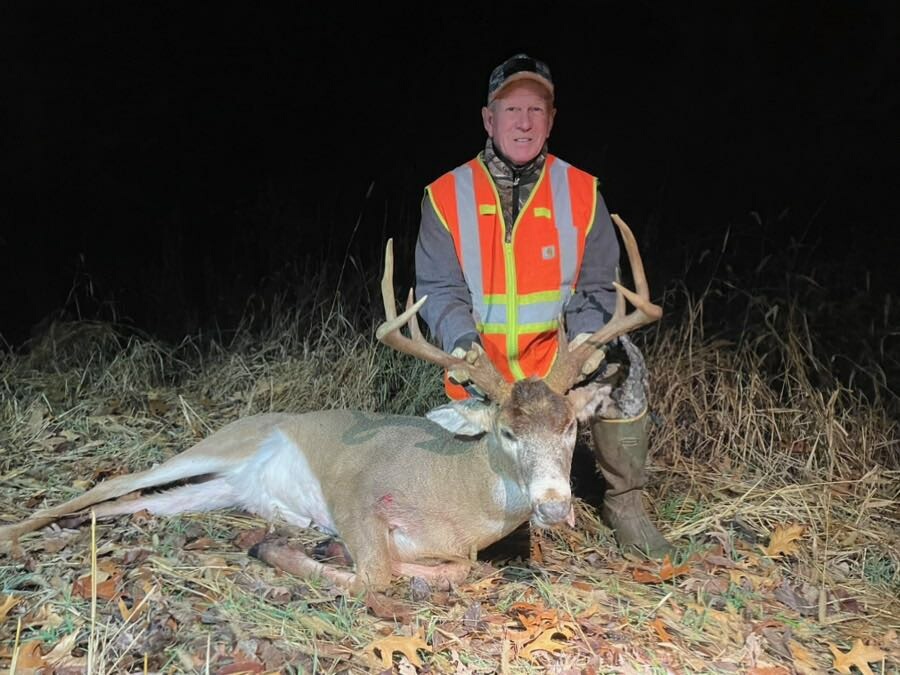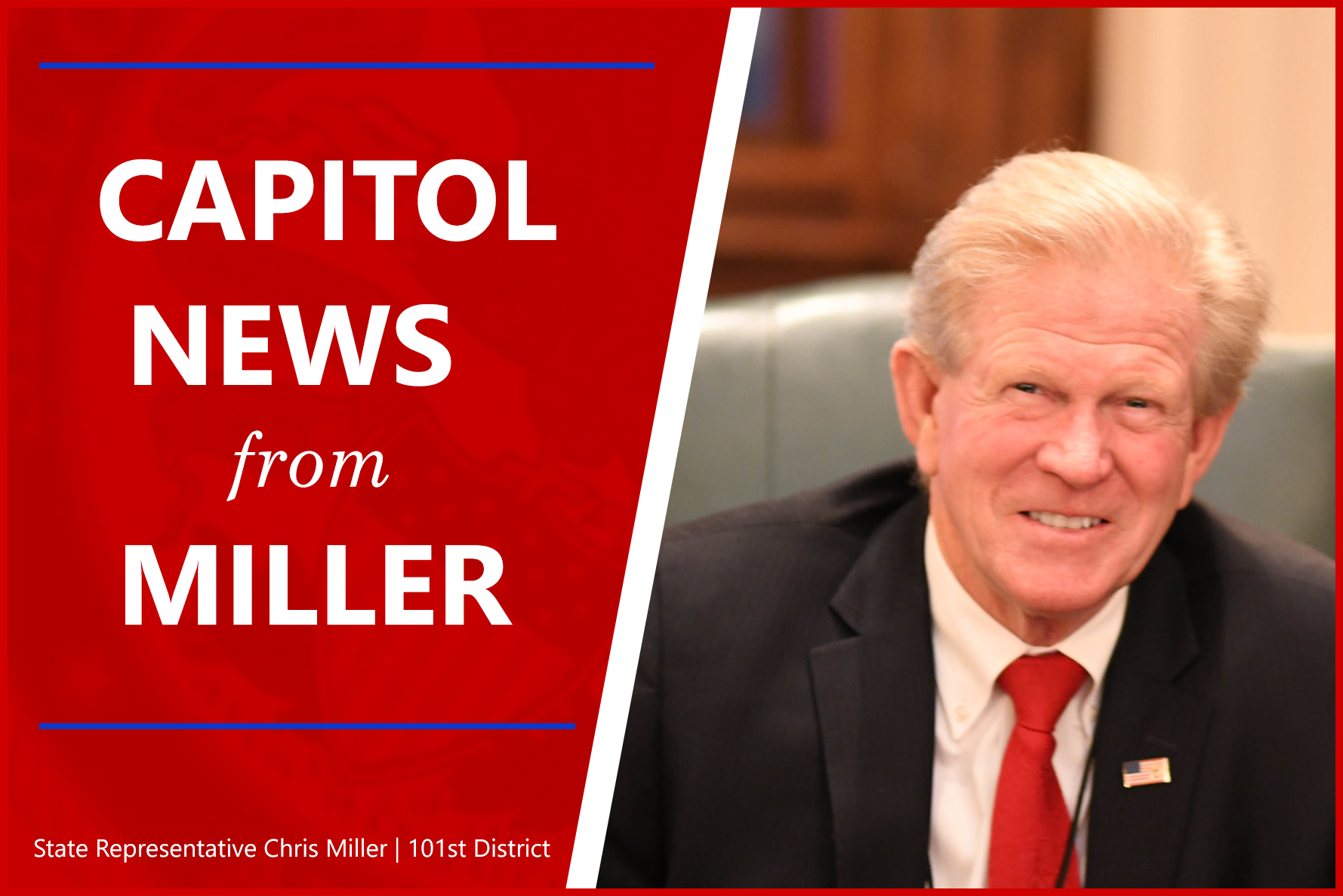BUDGET
GOMB projects State budget deficits in FY25 and following years. The “Illinois Economic and Fiscal Policy Report,” submitted in November 2023 by the Governor’s Office of Management and Budget (GOMB), contains long-term projections covering spending and tax revenue trends faced by the State of Illinois. The GOMB projects continued compounding increases in the expenses faced by several key areas of State general-funds spending, particularly health care costs, pensions, and mandated education funding increases. The GOMB projects general funds budgeted spending, including pensions, rising from $48.3 billion in FY24 to almost $55.8 billion five years down the road in FY29. This is independent of further spending increases requested by all of the advocacy groups who push for more State funding every year.
House Republicans have warned that State spending has outpaced core revenue growth over recent years. Analyses show that the State has become increasingly reliant on one-time revenue sources to fund new and existing spending programs. The GOMB Five-Year projection reinforces this belief, showing that the projected structural State deficit will rise from $891 million in FY25 to $1,661 million in FY27. Furthermore, these deficit projections do not fully account for the possibility of an economic downturn during these years. A U.S. or global recession would further reduce State tax revenues and would further widen what is already a projected structural deficit.
To try to deal with these deficits, Illinois is building up its Budget Stabilization Fund, a special State fund often called a “rainy day fund” in news stories and accounts. The cash and cash-equivalent funds on deposit in the Budget Stabilization Fund have now reached more than $2 billion. Illinois’ rainy day fund is credited by observers with helping pull the State back from the brink of below-investment-grade debt status. However, Illinois’ current spending patterns mean that the Budget Stabilization Fund is only part of the answer to Springfield’s long-term budget challenge. The GOMB report indicates that, based on Illinois’ current (FY24) spending rates for budget items based on general funds, the $2 billion figure will cover less than 15 days of State spending on pensions and operating expenses.
IMMIGRATION
Leader McCombie Discusses Migrant Crisis with Congresswoman Flores. House Minority Leader Tony McCombie met with former Congresswoman Mayra Flores to discuss the ongoing migrant crisis affecting Illinois, which includes a potential supplemental budget. Congresswoman Flores won the special election for Texas’ 34th Congressional District and became the first Mexican-born woman to serve in Congress — and one of a few Republicans to ever represent the Rio Grande Valley in Washington, D.C. She discussed her experience living in and representing a border district, and reflected on the failed federal border policies of the current administration.
Earlier this year, Leader McCombie traveled to McAllen, Texas, which is located in Flores’ district, to witness the border crisis firsthand. “Immigration is no longer just a federal issue, but is affecting all of us at the national, state, and even local levels,” said McCombie. “In Texas, I met the folks who protect, process, and assist migrants, including law enforcement, border patrol agents, and humanitarian aid workers. My experience in Texas made me realize just how massive and complicated this issue is. Texas, Florida, Arizona, and other states should not be left to deal with this issue alone. However, the current situation is not working for Illinois, and poor policymaking and a lack of transparency from Democrats has made it much worse.”
Over the last six months Illinois has felt the impact of this crisis: from healthcare coverage for the undocumented exceeding the appropriated amount within one single month, to $160 million of state funds shifted – without legislative oversight – in just the last six weeks. The City of Chicago’s disastrous response to this crisis has only further exacerbated the problem, leading Governor Pritzker to come in with his own plan without any discussion from Republicans.
“Pritzker thinks he can wave his magic wand and fix the illegal immigration crisis on his own, Rep. Miller stated. “The truth is that we are in a deep hole, thanks to Democrats, and now taxpayers are bailing out the Governor from his poor leadership decisions. Illinois residents deserve better and we need to close the southern border now.”
The General Assembly will now consider a supplemental budget bill to cover costs for both asylum seekers as well as undocumented immigrants and McCombie is asking for House Republicans to be included in those discussions.
“House Republicans, representing parts of all 102 counties, want and need to be part of the discussion to ensure a transparent process for working families. Illinoisans cannot afford more taxes to pay for unfunded programs that are spiraling out of control. We must be disciplined now so we can continue to fund our priorities – education, job growth, public safety, and caring for our most vulnerable citizens.”
OUTDOOR SPORTS
First weekend of firearm deer harvest shows increase in deer taken. During the three-day period of November 17 through November 19, licensed hunters reported the taking of 53,348 deer to the Illinois Department of Natural Resources (IDNR). This was a 2% increase from the 52,354 deer reported during the comparable weekend in 2022. Although breechloading firearms are no longer the only way to take deer – increasing numbers of archery hunters also sit in Illinois deer stands – the standard firearm weekends remain the most intense time slots in the Illinois fall deer hunt.

A second breech-loading firearm season will open on November 30 and close on December 3. Nonstandard firearm hunting periods cover antlerless-only deer, localized chronic wasting disease deer, and the muzzleloading weekend of December 8 through December 10. Each specialized hunting period has its own rules, time periods, and localities. IDNR operates a website with updates on the remaining deer hunts and hunting periods of the 2023-24 deer hunting season.
STATE GOVERNMENT
Illinois State Police creates online form for reporting of public-sector corruption. Illinois has a long-standing history of public corruption. Four of Illinois’ last eleven governors have served time in federal prison and numerous elected officials have been convicted or are awaiting trial for public corruption, including former House Speaker Michael J. Madigan.
The Special Investigations Unit, a detection operation within the State Police, has posted an online citizen complaint form for the immediate reporting of criminal misconduct by elected officials and government employees. Examples of criminal misconduct include asking for or demanding an under-the-table payment or favor, either paid directly or transferred through a third party, and offering some sort of governmental service in response. Government employees include not only elected officials, but also people who were appointed by, or are answerable to, an elected official or public administrator.
The State Police form requires the reporting of the name and title of the person being reported, the county where the alleged incident took place, and a summary of the alleged incident. Although people who submit reports to the Special Investigations Unit do not have to include their names and physical addresses, it is required that they submit phone numbers and e-mail addresses. Investigators may contact those who submit complaints to gather information about the alleged incidents of public corruption.
